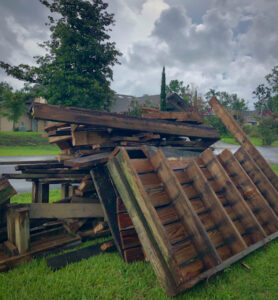
Photo by John Griswold
My sons and I were resting while it rained. I had asked them to help me demo a damaged deck, and while I ran the saw, they carried joists and deck lumber to the curb. We had only worked a couple of hours but were dirty and soaked with sweat and rain. It felt nice to share the moment. We would drink some water and do another hour or so before my elder son would have to get ready to go to his summer job. He brought up how some guys like to challenge whether or not someone else has done a full day’s work. He wanted to know, genuinely, if he ever had.
That depends. The challenge reflects a certain trades attitude and can vary in wording and emphasis, depending how much the challenger believes they have the upper hand: Have you ever done a hard day’s work in your life? Sometimes a slur on parentage is added at the end. What is meant, of course, is some sort of manual labor; tools; uncomfortable or challenging conditions.
The discussion probably started because I had been comparing jobs that kids of my place and time worked as teenagers with the seemingly fewer ones available to my teen sons.
I mowed yards (“no riding mowers then,” I tell them), worked at a state park (“rattlesnake-feeding and dutch-oven cobbler on the campfire”), picked a little fruit (“that’ll make your back and knees hurt”), bussed and washed dishes and kitchen pots at Big Daddy’s (“my feet”), worked the Hardee’s (“the grease rotted my boots off”), and was in the army by 19 (“not my first choice, let me tell you”).
My kids have digitally color-corrected and sized images for an online business; lifeguarded; and worked at a nice hotel. I start to realize none of those jobs I had were really first choices.
But old habits and reverse snobbery are hard to break. Just this week I ordered myself a t-shirt with the Seabees logo on the front—I attended the Seabee underwater construction school the year Chester Nimitz graduated Annapolis—and on the back, “The difficult we do now. The impossible takes a little longer.” It is not even the right slogan.
If any of us are very lucky we get jobs that challenge and fulfill us, serve as modes of practice of conscious living, and give us the cash to buy what we need. These tend to feel less hard.
Without a doubt, laboring all day in heat and humidity is hard, and you know when you have worked a full day. But the old guy I worked next to briefly at a factory that made parts for fighter jets had been grinding microscopic burrs off stainless-steel venturi tubes with a pneumatic tool for 30 years, hunched on a stool. A friend’s mother-in-law has worked at her local WalMart for 30 years, is not allowed to sit, and her bathroom breaks are monitored. She was fired recently for a week when a customer made a false complaint, and only got her job back by an accidental reversal.
Meanwhile, my friend Larry was paid four-grand for a day on a film set. He sat around, snacked from the craft table, chatted up other actors, but had to be there 12 hours, with a migraine, doing nothing—not even working on his own business he runs for his true living. Yesterday I put in 14 hours writing, on my bed, which sounds nice, but I got my own eyestrain headache and was exhausted by the end of it—or maybe by reaching the end of two weeks of field research and interviews. But are those hard days’ work?
I know I would much rather do them than lay armored pipe off a construction barge, or many of the other jobs I have had to do. My wish for my boys is that they will be allowed to do something they like, even when it is hard—and sometimes, when conditions are right, because it is hard.
